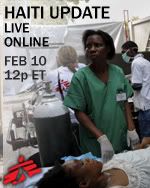Haiti, September 22, 2010…
With 1.3 million displaced people in 1,300 camps, homelessness is the new normal here.
Some of the residents of those 1300 tent-cities have been writing letters to humanitarian organizations through letter-boxes set up by the International Organization for Migration.
I don’t have work, my tarp is torn, the rain panics me, my house was crushed, I don’t have money to feed my family, I would really love it if you would help me,” wrote Marie Jean Jean.
“M te konn renmen lapli,“ says a child in a tent. “I used to love the rain.” But now…
Rain means that the floor on which he sleeps turns to mud. Rain now means sometimes standing up all night long in fear of floods.
Pakistan, September 22, 2010
The outside world cannot foot the entire bill for Pakistan’s recovery from devastating floods and the Pakistani government must do more, US special envoy Richard Holbrooke said on Monday.
The day after world donors raised aid pledges to almost two billion dollars, Holbrooke said the eventual cost of the monsoon disaster could run into the “tens of billions of dollars.”
The same article mentions that now 12 million people in Pakistan need “emergency food aid.”
About 105,000 kids younger than 5 are at risk of dying from severe acute malnutrition over the next six months, UNICEF estimates.
“You’re seeing children who were probably very close to the brink of being malnourished, and the emergency has just pushed them over the edge,” says Erin Boyd, a UNICEF emergency nutritionist working in southern Pakistan. “There’s just not the capacity to treat this level of severe acute malnutrition.”
So many children were already on the brink of severe malnutrition before the floods, and I guess their parents always hoped for a better tomorrow, but now what can they really hope for?
A jobless father of five who lost his house in Pakistan’s floods killed himself by setting himself on fire in front of the prime minister’s house, relatives and officials said.
Mohammad Akram, 30, doused himself before scores of people in front of Prime Minister Yusuf Raza Gilani’s family residence in the eastern city of Multan Sunday. Mohammad Asif, Akram’s brother, said he had been looking for a job for several months.
“We had a mud-brick house which was washed away by the floods and now we are homeless.”



